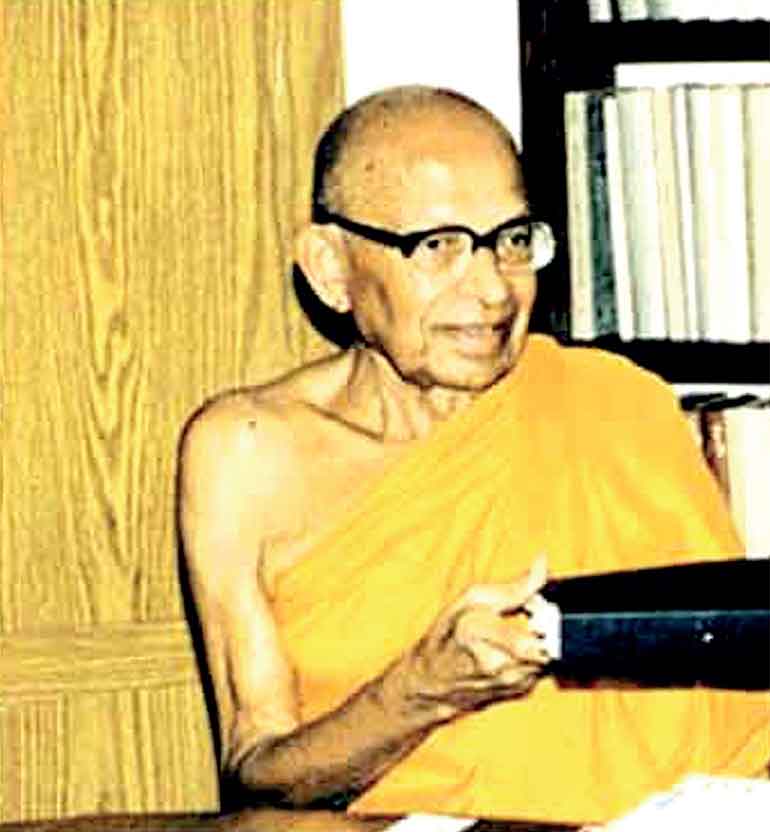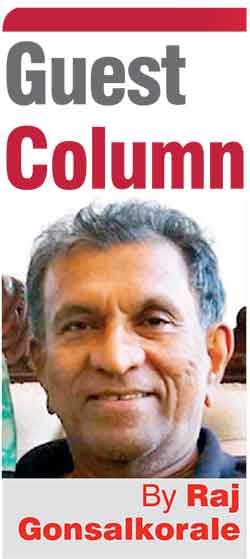Saturday Feb 21, 2026
Saturday Feb 21, 2026
Tuesday, 10 June 2025 00:00 - - {{hitsCtrl.values.hits}}

Ven. Rahula espoused critical thinking as an attempt to understand rather than challenge or dispute the Buddhist doctrine
“Free” critical thinking, in a philosophical sense, refers to the ability to think independently, without being unduly influenced by external pressures or internal biases. It involves questioning assumptions, analysing information objectively, and forming reasoned judgments based on evidence and logic. Essentially, it’s about thinking critically for oneself, rather than passively accepting information or opinions.
Keeping in line with the ethos of what Venerable Rahula stood for all his life, his guiding beliefs, ideals and practice of what he believed in, primarily the freedom to think critically and look at what Buddha taught from the prism of Bahujana Hithaya, Bahujana Sukaya (for the good of the many, for the happiness of the many”), a commemorative event was held to celebrate the 118th birth anniversary of Venerable Walpola Rahula on 24 May at the Sri Lanka Foundation in the presence of a large and distinguished gathering. The event witnessed a renaissance of those ideals and beliefs so eloquently expressed by the keynote speaker at the event Professor Nirmal Ranjit Devasiri, from the department of History Faculty of Arts University of Colombo, specialising in social transformation in agrarian societies, history and ideology, European colonialism in Asia, post-colonial state-building, and ethno-nationalism.
A panel discussion followed, with eminent panellists that included Venerable Galkande Dhammananda, head of the Walpola Rahula Institute, Chulananda Samaranayake, one of the major translators of internationally acclaimed literary books, a poet of four anthologies of poetry and an author of a book of short stories, Dr. Sunil Wijesiriwardena, literary critic, academic, researcher, civil activist, university lecturer, poet, writer, author, playwright, and Professor Prabha Manuratne, the discussion moderator who is engaged in interdisciplinary research focusing on violence and representations of violence, and with expertise in English Studies, Film Studies, and Cultural Studies. She is also an activist who works on women’s rights and education rights in Sri Lanka.
Free and critical thought was an anathema to those responsible for promoting dogmatic adherence and for those misrepresenting and misinterpreting historical context, as well as the governance status quo dominated by a few
A fitting tribute
The general opinion at the end of the evening’s proceedings was that the intellectually enriching, and ideologically incisive dialogue and discussions at the event should be continued by the Walpola Rahula Institute as a fitting tribute to a person who was an embodiment of free and critical thinking, Venerable Walpola Rahula. In keeping with the Buddhist framework of the Walpola Rahula Institute, and the ongoing project of the Walpola Rahula Institute, Heta Bhikshuwa (tomorrows Monk) it was felt that a broader discussion based on the Bhikshuwage Urumaya (Heritage of the Buddhist Monk) authored by Ven. Walpola Rahula who encouraged free critical thinking by individuals to consider information and arguments without being swayed by personal biases, emotions, or external pressures, questioning assumptions, examining the logic of underlying arguments, openness to diverse viewpoints and a willingness to consider alternative interpretations of information, would be most appropriate.
 Some critical issues were raised during the event. The near dogmatic adherence to traditional Buddhist conventions without consideration of their historical context, and the practice of contemporary conventions introduced and spearheaded by institutionalised Buddhism, as well as the governing status quo, both, misinterpreting and misrepresenting the historical context and also basing contemporary conventions on narrow avenues of thought by a few, rather than through a broad-based consultative approach. Free and critical thought was an anathema to those responsible for promoting dogmatic adherence and for those misrepresenting and misinterpreting historical context, as well as the governance status quo dominated by a few.
Some critical issues were raised during the event. The near dogmatic adherence to traditional Buddhist conventions without consideration of their historical context, and the practice of contemporary conventions introduced and spearheaded by institutionalised Buddhism, as well as the governing status quo, both, misinterpreting and misrepresenting the historical context and also basing contemporary conventions on narrow avenues of thought by a few, rather than through a broad-based consultative approach. Free and critical thought was an anathema to those responsible for promoting dogmatic adherence and for those misrepresenting and misinterpreting historical context, as well as the governance status quo dominated by a few.
Another issue raised was the need to consider why institutions such as the education system as it is understood today, came into being with education catering to economic, social and political dictates rather than for the acquisition of knowledge.
Within the space of time available, Professor Devasiri, in his presentation titled “Struggle for free education, Bhikkhu politics in the 1940s and in contemporary Sri Lanka”, elaborated on the seeds as it were, and the growth of the movement for free education led by radical thinking persons both within the Bhikkhu order and amongst lay persons. Free education was seen as a means of upward social mobility, especially for the middle class of the country and the upper layers of the lower middle class, all of whom probably lived a life without much hope for them and their future generations. It was also viewed by many within the upper middle class and sections of the ruling elite as a threat to their influence and their way of life sustained by the existing way of governance.
Free education
Reportedly, a rhetorical question had been posed to the chairman of the education commission at the time, C.W.W. Kannangara, by a senior government political figure as to who would pluck coconuts if there was upward social mobility of the masses as a consequence of free education!
Paradoxically, even some within the Buddhist monk establishment had issues with free education as it was seen as challenging the status quo relating to traditions and the traditional education ethos, which formed the power and influence base of some senior monks in the hierarchy of the Buddhist establishment.
However, as pointed out by Professor Devasiri, the extensive support primarily from the lower strata of society, as well as some liberal minded individuals from the upper middle class, and of course a large number of monks from the Buddhist establishment had provided an unstoppable impetus towards free education.
It was seen as a means of resisting colonial dictates supporting the exclusiveness of education to a select few and instead broad basing it as a means of unshackling them from social impediments the masses were facing. Venerable Rahula’s active association with the Vidyalankara Bhikkhu movement, which was seen as a departure from the historical traditional mindset and towards a more active participation of Bhikkhus in social and political issues in keeping with Buddha’s Rigveda based dictum of “for the happiness of many and for the benefit of many”.
Professor Devasisri also pointed out that historically, even going back to the Anuradhapura period, the Buddhist monks had been the real power and influence amongst the people, and the effective unifying force eclipsing the power of Royalty in the country. Rejuvenation of this power, which had its ups and downs over decades, had begun consequent to the advent of colonialism in the country, especially British colonialism, and it gathered serious momentum during the struggle for free education.
A yet unsolved contradiction
In the context of the enormous influence exerted by the Buddhist monk’s establishment, it was incumbent on them to use this influence and power wisely for the benefit of the people. A yet unsolved contradiction however appears to be there in so far as how this influence should be used by Buddhist monks to address the contemporary situation of the country, which was different from the historical, tradition bound Sinhala Buddhist country which they took as the natural ruling order of the country.
The panel discussion further elaborated and examined the principal issues presented by Professor Devasiri. While Venerable Dhammananda, who had been the closest to Ven. Rahula for decades presented a few anecdotes to illustrate Venerable Rahula, the human being, others raised issues like the rigidity of the education system which focussed on a stereotyped, discipline-based approach rather than acquisition of knowledge and with little room for free thinking. The narrowness of the relatively contemporary concept of dependent arising (Patticca Samuppadaya) was also highlighted.
While Buddha’s concept behind dependent origination had been the inter dependency of many realities and circumstances which impacted and then resulted in a reaction or palaya, it was argued that it would be misleading to assign a narrowness to reason or the cause, which had a particular reaction or the palaya. This narrowness had originated from the more modernistic (scientific) view that every action was a linear development as the result of a cause taken in a very narrow sense. More thought provoking views on the role of Buddhist monks, whether they should be divided into a monastic tradition and a social upliftment tradition or as it existed during Buddha’s time, whether both traditions should be a combined, single tradition, and looking at existence or samsara from a multi-faceted approach and questioning the “why” and not limiting oneself to examining the “how” as being important to humanity were presented.
Understand rather than challenge
As emphasised by all speakers, Ven. Rahula espoused critical thinking as an attempt to understand rather than challenge or dispute the Buddhist doctrine. Buddha himself had maintained the dictum, “come and see” or ehi passiko, meaning, question even the Dhamma and what the Buddha said in order to understand the Dhamma. The doctrine taught by the Buddha some 2,600 years ago was carried on to many generations through an oral tradition after his death in 480 BCE, until it was written down in 25 BCE in Sri Lanka. While it is not a conclusive or definitive statement, it is natural that passage of time could influence the oral tradition and include interpretations of Buddha’s teachings. In this backdrop, a critical and questioning look at the Dhamma should be viewed as a logical exercise although it must be noted and understood that it should be done through the practice of the basic tenants of the Dhamma rather that doing it as an academic exercise, in order to fully understand and appreciate the Dhamma.
The full program of the event may be viewed by following the link below:
https://www.youtube.com/watch?v=j6IMHc81jno.